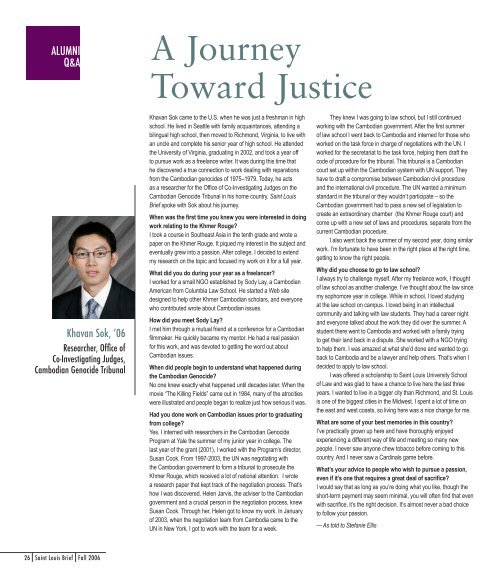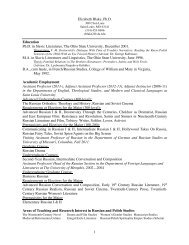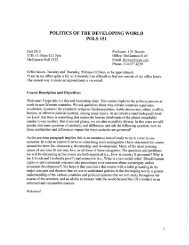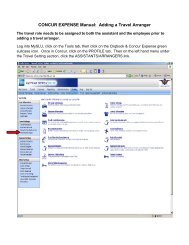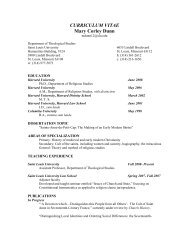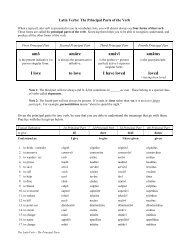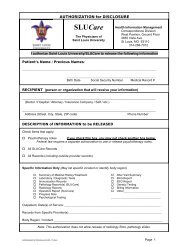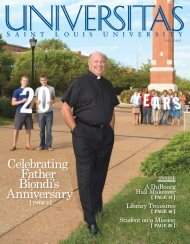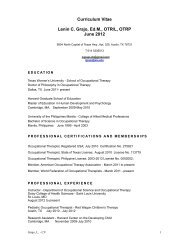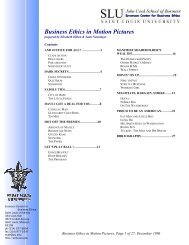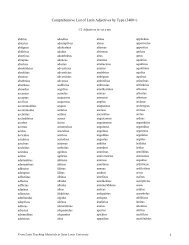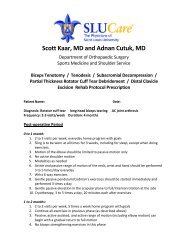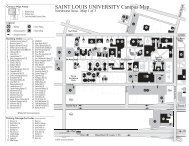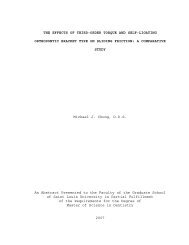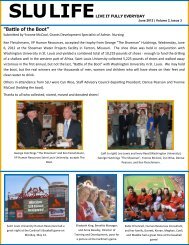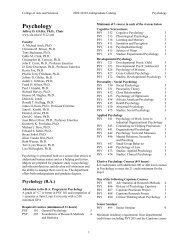willkommen in - Saint Louis University
willkommen in - Saint Louis University
willkommen in - Saint Louis University
Create successful ePaper yourself
Turn your PDF publications into a flip-book with our unique Google optimized e-Paper software.
ALUmni<br />
Q&A<br />
Khavan sok, ’06<br />
Researcher, Office of<br />
Co-<strong>in</strong>vestigat<strong>in</strong>g Judges,<br />
Cambodian genocide Tribunal<br />
A Journey<br />
Toward Justice<br />
Khavan Sok came to the U.S. when he was just a freshman <strong>in</strong> high<br />
school. He lived <strong>in</strong> Seattle with family acqua<strong>in</strong>tances, attend<strong>in</strong>g a<br />
bil<strong>in</strong>gual high school, then moved to Richmond, Virg<strong>in</strong>ia, to live with<br />
an uncle and complete his senior year of high school. He attended<br />
the <strong>University</strong> of Virg<strong>in</strong>ia, graduat<strong>in</strong>g <strong>in</strong> 2002, and took a year off<br />
to pursue work as a freelance writer. It was dur<strong>in</strong>g this time that<br />
he discovered a true connection to work deal<strong>in</strong>g with reparations<br />
from the Cambodian genocides of 1975–1979. Today, he acts<br />
as a researcher for the Office of Co-Investigat<strong>in</strong>g Judges on the<br />
Cambodian Genocide Tribunal <strong>in</strong> his home country. Sa<strong>in</strong>t <strong>Louis</strong><br />
Brief spoke with Sok about his journey.<br />
When was the first time you knew you were <strong>in</strong>terested <strong>in</strong> do<strong>in</strong>g<br />
work relat<strong>in</strong>g to the Khmer Rouge?<br />
I took a course <strong>in</strong> Southeast Asia <strong>in</strong> the tenth grade and wrote a<br />
paper on the Khmer Rouge. It piqued my <strong>in</strong>terest <strong>in</strong> the subject and<br />
eventually grew <strong>in</strong>to a passion. After college, I decided to extend<br />
my research on the topic and focused my work on it for a full year.<br />
What did you do dur<strong>in</strong>g your year as a freelancer?<br />
I worked for a small NGO established by Sody Lay, a Cambodian<br />
American from Columbia Law School. He started a Web site<br />
designed to help other Khmer Cambodian scholars, and everyone<br />
who contributed wrote about Cambodian issues.<br />
How did you meet Sody Lay?<br />
I met him through a mutual friend at a conference for a Cambodian<br />
filmmaker. He quickly became my mentor. He had a real passion<br />
for this work, and was devoted to gett<strong>in</strong>g the word out about<br />
Cambodian issues.<br />
When did people beg<strong>in</strong> to understand what happened dur<strong>in</strong>g<br />
the Cambodian genocide?<br />
No one knew exactly what happened until decades later. When the<br />
movie “The Kill<strong>in</strong>g Fields” came out <strong>in</strong> 1984, many of the atrocities<br />
were illustrated and people began to realize just how serious it was.<br />
Had you done work on Cambodian issues prior to graduat<strong>in</strong>g<br />
from college?<br />
Yes. I <strong>in</strong>terned with researchers <strong>in</strong> the Cambodian Genocide<br />
Program at Yale the summer of my junior year <strong>in</strong> college. The<br />
last year of the grant (2001), I worked with the Program’s director,<br />
Susan Cook. From 1997-2003, the UN was negotiat<strong>in</strong>g with<br />
the Cambodian government to form a tribunal to prosecute the<br />
Khmer Rouge, which received a lot of national attention. I wrote<br />
a research paper that kept track of the negotiation process. That’s<br />
how I was discovered. Helen Jarvis, the adviser to the Cambodian<br />
government and a crucial person <strong>in</strong> the negotiation process, knew<br />
Susan Cook. Through her, Helen got to know my work. In January<br />
of 2003, when the negotiation team from Cambodia came to the<br />
UN <strong>in</strong> New York, I got to work with the team for a week.<br />
They knew I was go<strong>in</strong>g to law school, but I still cont<strong>in</strong>ued<br />
work<strong>in</strong>g with the Cambodian government. After the first summer<br />
of law school I went back to Cambodia and <strong>in</strong>terned for those who<br />
worked on the task force <strong>in</strong> charge of negotiations with the UN. I<br />
worked for the secretariat to the task force, help<strong>in</strong>g them draft the<br />
code of procedure for the tribunal. This tribunal is a Cambodian<br />
court set up with<strong>in</strong> the Cambodian system with UN support. They<br />
have to draft a compromise between Cambodian civil procedure<br />
and the <strong>in</strong>ternational civil procedure. The UN wanted a m<strong>in</strong>imum<br />
standard <strong>in</strong> the tribunal or they wouldn’t participate – so the<br />
Cambodian government had to pass a new set of legislation to<br />
create an extraord<strong>in</strong>ary chamber (the Khmer Rouge court) and<br />
come up with a new set of laws and procedures, separate from the<br />
current Cambodian procedure.<br />
I also went back the summer of my second year, do<strong>in</strong>g similar<br />
work. I’m fortunate to have been <strong>in</strong> the right place at the right time,<br />
gett<strong>in</strong>g to know the right people.<br />
Why did you choose to go to law school?<br />
I always try to challenge myself. After my freelance work, I thought<br />
of law school as another challenge. I’ve thought about the law s<strong>in</strong>ce<br />
my sophomore year <strong>in</strong> college. While <strong>in</strong> school, I loved study<strong>in</strong>g<br />
at the law school on campus. I loved be<strong>in</strong>g <strong>in</strong> an <strong>in</strong>tellectual<br />
community and talk<strong>in</strong>g with law students. They had a career night<br />
and everyone talked about the work they did over the summer. A<br />
student there went to Cambodia and worked with a family try<strong>in</strong>g<br />
to get their land back <strong>in</strong> a dispute. She worked with a NGO try<strong>in</strong>g<br />
to help them. I was amazed at what she’d done and wanted to go<br />
back to Cambodia and be a lawyer and help others. That’s when I<br />
decided to apply to law school.<br />
I was offered a scholarship to Sa<strong>in</strong>t <strong>Louis</strong> <strong>University</strong> School<br />
of Law and was glad to have a chance to live here the last three<br />
years. I wanted to live <strong>in</strong> a bigger city than Richmond, and St. <strong>Louis</strong><br />
is one of the biggest cities <strong>in</strong> the Midwest. I spent a lot of time on<br />
the east and west coasts, so liv<strong>in</strong>g here was a nice change for me.<br />
What are some of your best memories <strong>in</strong> this country?<br />
I’ve practically grown up here and have thoroughly enjoyed<br />
experienc<strong>in</strong>g a different way of life and meet<strong>in</strong>g so many new<br />
people. I never saw anyone chew tobacco before com<strong>in</strong>g to this<br />
country. And I never saw a Card<strong>in</strong>als game before.<br />
What’s your advice to people who wish to pursue a passion,<br />
even if it’s one that requires a great deal of sacrifice?<br />
I would say that as long as you’re do<strong>in</strong>g what you like, though the<br />
short-term payment may seem m<strong>in</strong>imal, you will often f<strong>in</strong>d that even<br />
with sacrifice, it’s the right decision. It’s almost never a bad choice<br />
to follow your passion.<br />
— As told to Stefanie Ellis<br />
Q&A<br />
Don Anton’s life has<br />
taken him far — literally.<br />
A St. <strong>Louis</strong> native, he<br />
spent the first 26 years of<br />
his life <strong>in</strong> his hometown,<br />
pledg<strong>in</strong>g allegiance to<br />
the sports teams he still,<br />
to this day, follows with<br />
rapt attention.<br />
Though his career has taken him to another cont<strong>in</strong>ent, he<br />
still rema<strong>in</strong>s connected <strong>in</strong> ways that would make his city<br />
proud. He took some time to chat with Sa<strong>in</strong>t <strong>Louis</strong> Brief<br />
about his journey from the Show-Me-State to the land of<br />
kangaroos and didgeridoo, his passion for <strong>in</strong>ternational<br />
environmental law and his contributions to shap<strong>in</strong>g future<br />
generations of lawyers.<br />
you’ve lived abroad a while. Do you still th<strong>in</strong>k<br />
of St. <strong>Louis</strong>?<br />
St. <strong>Louis</strong> is still <strong>in</strong> my bones. I have pictures of all the<br />
sport<strong>in</strong>g venues of my childhood (Sportsman’s Park, the<br />
Arena, the old Busch Stadium) on the walls of my office.<br />
I still consider the city my first home and cont<strong>in</strong>ue to<br />
religiously follow the Card<strong>in</strong>als (naturally delighted with the<br />
World Series w<strong>in</strong>), Billikens and Blues via video and audio<br />
stream<strong>in</strong>g broadcasts.<br />
What made you want to get <strong>in</strong>to law?<br />
I was born <strong>in</strong> 1960 and grew up watch<strong>in</strong>g Americans make<br />
melioristic legal claims for equality, civil rights, greater<br />
economic participation, environmental protection, etc. I<br />
frequently watched and read news about lawyers help<strong>in</strong>g<br />
Americans make these progressive and socially beneficial<br />
claims through law. As a result, like many, I came to<br />
develop a view of the lawyer as “hero,” a champion for the<br />
oppressed, a fighter for the public <strong>in</strong>terest. I went to law<br />
school because I wanted to be like that — to advocate<br />
worthy causes on behalf of others.<br />
Why did you choose to get <strong>in</strong>to <strong>in</strong>ternational/<br />
environmental law?<br />
I did not contemplate practic<strong>in</strong>g either International<br />
Law or Environmental Law when I entered law school.<br />
donald K. anton, ’86<br />
Professor, <strong>University</strong> of melbourne Law School<br />
I did not take either subject while <strong>in</strong> law school. Even<br />
when I graduated, these fields (and especially their<br />
<strong>in</strong>tersection) were not on my radar. Instead, after several<br />
years of a scenic, but not very “heroic” practice of law<br />
<strong>in</strong> Boise, Idaho — mostly defend<strong>in</strong>g the <strong>in</strong>terests of<br />
m<strong>in</strong><strong>in</strong>g companies, polluters and <strong>in</strong>surance companies<br />
— I made the decision to try to become an <strong>in</strong>ternational<br />
environmental lawyer. My decision was largely motivated<br />
by prom<strong>in</strong>ent transboundary environmental <strong>in</strong>cidents that<br />
took place <strong>in</strong> the 1980s, like Chernobyl, Exxon Valdez,<br />
Ra<strong>in</strong>bow Warrior. It seemed to me that there was very<br />
little applicable law and that there was an opportunity to<br />
develop not only expertise, but the law itself, <strong>in</strong> an area<br />
that the <strong>in</strong>ternational community would <strong>in</strong>creas<strong>in</strong>gly need<br />
and call on.<br />
I was also personally restless at that time (1989-1990) and<br />
decided to look at postgraduate legal education outside of<br />
the United States. The government of Australia offered a<br />
full scholarship to study International Environmental Law <strong>in</strong><br />
Sydney and I arrived <strong>in</strong> Australia <strong>in</strong> March of 1991. With<strong>in</strong><br />
months I met my future wife <strong>in</strong> Canberra (where we now<br />
live and teach together). A year and a half after com<strong>in</strong>g to<br />
Australia, my still future wife and I traveled to Columbia<br />
<strong>University</strong> School of Law <strong>in</strong> New York so she could pursue<br />
her S.J.D. degree. I was eventually hired as a Research<br />
Associate at Columbia <strong>University</strong>, work<strong>in</strong>g with two of the<br />
world’s most <strong>in</strong>fluential <strong>in</strong>ternational lawyers, Professors<br />
Lou Henk<strong>in</strong> and Oscar Schacter. When we returned to<br />
Australia <strong>in</strong> 1994, both of us were hired by the <strong>University</strong><br />
of Melbourne Law School. I created the first course <strong>in</strong><br />
International Environmental Law at Melbourne Law School<br />
<strong>in</strong> 1995 and have been teach<strong>in</strong>g and practic<strong>in</strong>g it ever s<strong>in</strong>ce.<br />
Describe your work.<br />
I teach law to aspir<strong>in</strong>g lawyers <strong>in</strong> Australia. International<br />
Environmental Law (IEL) is still my passion, but I have<br />
taught across the curriculum, <strong>in</strong>clud<strong>in</strong>g Property Law<br />
and Torts. The courses I regularly teach <strong>in</strong>clude: IEL,<br />
International Law, Mar<strong>in</strong>e and Coastal Law, Human<br />
Rights and the Environment, International Trade and the<br />
Environment, and Federalism and the Environment. I also<br />
cont<strong>in</strong>ue to teach <strong>in</strong> the United States. In 2003, I was a<br />
visit<strong>in</strong>g professor at the <strong>University</strong> of Michigan Law School,<br />
where I taught a course on International Environmental<br />
Law. In 2007, I will be a visit<strong>in</strong>g professor at the <strong>University</strong><br />
of Alabama School of Law, where I will be teach<strong>in</strong>g<br />
courses on International Human Rights and Environmental<br />
Justice and Rights.<br />
What other work do you do <strong>in</strong> your field?<br />
In addition to teach<strong>in</strong>g, I cont<strong>in</strong>ue to practice public<br />
<strong>in</strong>terest environmental law <strong>in</strong> Australia and around the<br />
world through participation <strong>in</strong> the Environmental Law<br />
26 Sa<strong>in</strong>t <strong>Louis</strong> Brief Fall 2006 Fall 2006 Sa<strong>in</strong>t <strong>Louis</strong> Brief 2<br />
ALUmni ALUmni PRoFiLe Q&A<br />
photo courtesy of Donald K. Anton, ’86<br />
Alliance Worldwide (E-LAW). E-LAW is a group of public<br />
<strong>in</strong>terest environmental lawyers, scientists and academics<br />
from 58 countries around the world that assist each<br />
other <strong>in</strong> protect<strong>in</strong>g the environment across borders. In<br />
my teach<strong>in</strong>g, I regularly have students assist my E-LAW<br />
colleagues with real cases around the world. I used to<br />
travel regularly to Papua New Gu<strong>in</strong>ea and the Solomon<br />
Islands to assist <strong>in</strong> environmental litigation and tra<strong>in</strong><strong>in</strong>g<br />
and I have served as a course <strong>in</strong>structor for the United<br />
Nations Environment Program <strong>in</strong> a course designed to<br />
tra<strong>in</strong> high-level adm<strong>in</strong>istrators from develop<strong>in</strong>g countries<br />
<strong>in</strong> environmental law and policy. My research cont<strong>in</strong>ues to<br />
focus on International Law and Environmental Law.<br />
What are the differences between legal education as well<br />
as the practice of law between the u.S. and Australia?<br />
The two most significant differences <strong>in</strong> legal<br />
education here are:<br />
1. Most students come to law school directly from high<br />
school. No first degree is required. As a result, students<br />
are much more immature and uncerta<strong>in</strong> about the<br />
future direction they want their lives to take.<br />
2. “Lectur<strong>in</strong>g” without a great deal of student participation<br />
is still widely used as the primary means of<br />
<strong>in</strong>struction as opposed to the use of Socratic or, more<br />
contemporarily, modified Socratic techniques.<br />
The three most significant differences <strong>in</strong> practice here are:<br />
1. Instead of a bar exam, most would-be lawyers get<br />
qualified to practice by do<strong>in</strong>g a six-month “practitioners”<br />
course follow<strong>in</strong>g graduation from law school.<br />
2. The profession is still, by custom, very much a split<br />
profession with barristers do<strong>in</strong>g the appearance work<br />
and solicitors do<strong>in</strong>g pretty much everyth<strong>in</strong>g else.<br />
3. Once admitted to practice <strong>in</strong> any jurisdiction <strong>in</strong><br />
Australia, you are automatically entitled to be admitted<br />
<strong>in</strong> every other jurisdiction under the Mutual Recognition<br />
Act 1992 (Cth).


